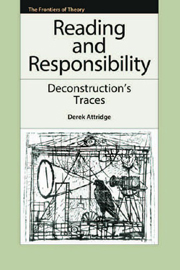Book contents
- Frontmatter
- Contents
- Acknowledgements
- Series Editor's Preface
- Introduction
- 1 Derrida, Deconstruction and Literary Criticism
- 2 Deconstruction Today: Literature, Postcolonialism and the Secret
- 3 Following Derrida
- 4 The Impossibility of Ethics: On Mount Moriah
- 5 Arche-jargon
- 6 Deconstruction and Fiction
- 7 Posthumous Infidelity: Derrida, Levinas and the Third
- 8 Roland Barthes's Obtuse, Sharp Meaning and the Responsibilities of Commentary
- 9 Nothing to Declare: J. Hillis Miller and Zero's Paradox
- 10 Radical Atheism and Unconditional Responsibility
- 11 The Place of Deconstruction: A Conversation with Jean-Michel Rabaté
- Bibliography
- Index
11 - The Place of Deconstruction: A Conversation with Jean-Michel Rabaté
Published online by Cambridge University Press: 12 September 2012
- Frontmatter
- Contents
- Acknowledgements
- Series Editor's Preface
- Introduction
- 1 Derrida, Deconstruction and Literary Criticism
- 2 Deconstruction Today: Literature, Postcolonialism and the Secret
- 3 Following Derrida
- 4 The Impossibility of Ethics: On Mount Moriah
- 5 Arche-jargon
- 6 Deconstruction and Fiction
- 7 Posthumous Infidelity: Derrida, Levinas and the Third
- 8 Roland Barthes's Obtuse, Sharp Meaning and the Responsibilities of Commentary
- 9 Nothing to Declare: J. Hillis Miller and Zero's Paradox
- 10 Radical Atheism and Unconditional Responsibility
- 11 The Place of Deconstruction: A Conversation with Jean-Michel Rabaté
- Bibliography
- Index
Summary
DA:
In thinking about the place of deconstruction, about deconstruction and place, I'm reminded of some comments made by Jacques Derrida at a conference I attended at the University of Irvine in 1987 entitled ‘The States of “Theory”’. Derrida had not noticed at first that ‘states’ in the title of the conference was in the plural, he told us, and he continued:
And I thought that the answer to this question – What is the state of theory today? – was then self-evident, it was obvious, hic et nunc. The state of theory, now and from now on, isn't it California? And even Southern California? (‘Some Statements and Truisms’, 63)
Derrida insisted that this was not just a joke (though it certainly had the audience laughing), and that the double meaning of ‘state’ would have to be taken on board in any analysis of the conference in which we were all participating, an analysis that would necessarily include a consideration of what he called ‘the geography and politics of theory’. Such an analysis would show that it was not just by chance that a conference on theory – including ‘deconstructive theory’ – was happening in Southern California.
Deconstruction, as Derrida uses the word, is not something anyone chooses to undertake but rather something that happens, and there is presumably no place that has any special privilege over others when it comes to the event of deconstruction in this sense.
- Type
- Chapter
- Information
- Reading and ResponsibilityDeconstruction's Traces, pp. 149 - 162Publisher: Edinburgh University PressPrint publication year: 2010

